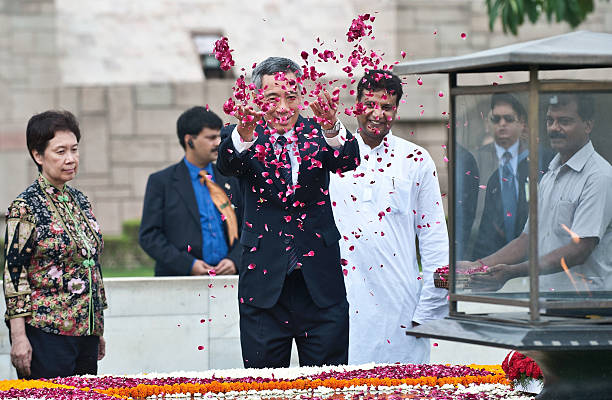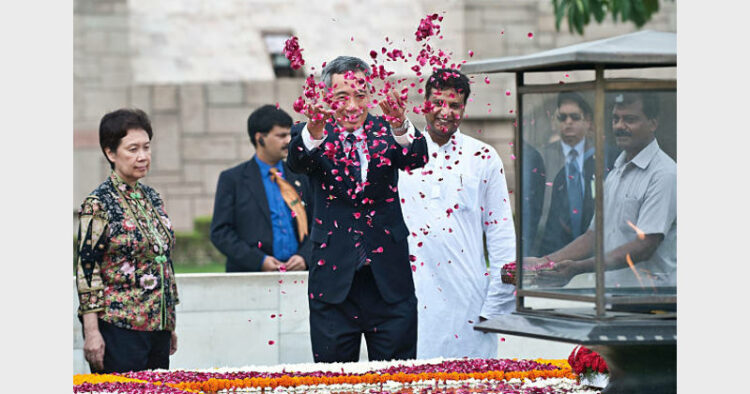
Lee Hsien Loong, Prime Minister of Singapore
The Swachh Bharat Mission is not just a programme to clean India’s environment, but a deeper reform to “transform the way we think, live and work”.
Four years ago, Prime Minister Narendra Modi launched the Swachh Bharat Mission to achieve the vision of a “Clean India” by 2019. Fittingly, 2 October 2019 is also the 150th birth anniversary of Mahatma Gandhi, who championed sanitation as a national priority. Over the last four years, India has made great progress, building more than 86 million toilets for households, and declaring nearly half a million (470,000) villages free of open defecation.
Singapore has travelled this journey too. Since independence, we have worked hard to create a clean and green living environment for our people. In the early days, many homes were not sewered. “Nightsoil” was collected in buckets, and transported by malodorous trucks to sewerage plants. Often the human waste was dumped into nearby streams and rivers, polluting and poisoning the waters. Unsanitary living conditions created many public health problems, including frequent outbreaks of waterborne diseases.
Our founding fathers resolved to act decisively. They launched a national campaign to “Keep Singapore Clean”. We sewered up every home, cleaned up our rivers, and made Singapore a clean and green city. In particular, we cleaned up the Singapore River. In the process we had to clear thousands of squatters, backyard industries, pig farms, and countless other sources of pollution in the catchment of the river. Today, a clean Singapore River flows through the city into Marina Reservoir, which feeds into our national water supply.
India is a country on a vastly different scale from Singapore. The River Ganga is almost a thousand times longer than the Singapore River. Yet there are some parallels in Singapore’s and India’s sanitation journeys.
First, both countries’ experiences demonstrate the importance of vision and leadership. The late Prime Minister Lee Kuan Yew and Prime Minister Modi both made it a priority to keep the country clean and green. They personally led public campaigns to raise awareness and mobilise the masses. Both picked up brooms, and joined the people to clean the streets. Prime Minister Modi has said that Mr Lee was a “personal inspiration”, and that he had drawn from Mr Lee’s idea that “transformation of a nation begins with a change in the way we are”. Indeed, the Swachh Bharat Mission is not just a programme to clean India’s environment, but a deeper reform to “transform the way we think, live and work”.
Second, success requires long-term national commitment. Singapore implemented a Sewerage Master Plan to separate our sewerage and drainage networks. The aim was to prevent rainwater from being contaminated, so that it could be collected and used. At the same time, Singapore recycles used water from sewage treatment plants, purifying it through reverse osmosis, to produce NEWater, an ultra-clean, high-grade water fit for drinking. We took one problem: what to do with used water, and turned it into a solution to another problem: water scarcity.
In India, the nationwide push to implement the Swachh Bharat Mission with key stakeholders, such as industry and schools, has shown promising results. The “2018 UNICEF Drinking Water, Sanitation and Hygiene in Schools: Global Baseline Report” highlighted that almost all schools in India have sanitation facilities built, compared to just 50 per cent of schools in 2006.
Third, both Singapore and India value international cooperation. The same solution may not work in a different country, but we can all benefit by learning from others and sharing experiences. I congratulate India on successfully hosting the inaugural Mahatma Gandhi International Sanitation Convention, which has brought together leaders, practitioners, and experts from around the world to share their sanitation stories. Singapore too hosts international forums such as the biennial World Cities Summit and Singapore International Water Week. In 2013, to raise awareness of the global sanitation challenge, the UN adopted Singapore’s resolution “Sanitation for All’, to commemorate 19 November as World Toilet Day.
Singapore is happy to share experiences with India as it continues to develop more liveable and sustainable Smart Cities across the country. Singapore has collaborated with India’s Town and Country Planning Organisation to train a hundred officials in urban planning, and water and waste management. Singapore also looks forward to cooperating with states like Andhra Pradesh and Maharashtra to provide urban solutions as they develop their cities.
I wish Prime Minister Modi and the People of India the very best in the Swachh Bharat Mission to “Clean India”. I also look forward to further cooperation between our two countries to achieve the UN Sustainable Development Goal of clean water and sanitation for our peoples for generations to come.
. . . . .














Comments